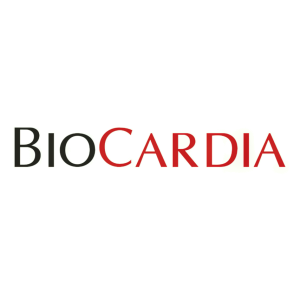BioCardia Announces Interim Efficacy Results in Phase III Pivotal CardiAMP Cell Therapy Heart Failure Trial
SUNNYVALE, Calif., Sept. 05, 2023 (GLOBE NEWSWIRE) -- BioCardia®, Inc. [Nasdaq: BCDA], a developer of cellular and cell-derived therapeutics for the treatment of cardiovascular and pulmonary disease, today announced it has finalized external review of interim data and evaluated interim efficacy results for the ongoing Phase III pivotal trial of CardiAMP® Cell Therapy for Heart Failure (CardiAMP HF, clinicaltrials.gov Identifier: NCT02438306), for which the FDA granted Breakthrough Designation for the treatment of heart failure of reduced ejection fraction (HFrEF).
The external review both confirmed the quality and appropriateness of the work by the Statistical Data Analysis Center at the University of Wisconsin and the DSMB in their review and recommendation. In order to enhance understanding of our heart failure program, BioCardia has taken steps, previously reviewed by the DSMB, to unblind itself to the interim results of the study and was provided a copy of the closed session study report presented to the DSMB for review.
The interim efficacy review by the DSMB did not include the final results of the study but is an analysis of the data as part of the adaptive statistical analysis plan. This review was based on the three-tiered Finkelstein-Schoenfeld (FS) hierarchical analysis of 12-month data, whose composite score comprises the primary efficacy endpoint of the CardiAMP HF study.
- For the first-tier, all cause death, including cardiac death equivalents such as heart transplant or left ventricular assist device placement at 12 months there were
5.6% of CardiAMP treatment patients versus5.3% for the control group (p = 0.42). All available follow-up in the patients followed up to 24 months showed a separation between groups with8.3% all cause death including cardiac death equivalents in the treatment group versus13.2% in the control group (p = 0.94), corresponding to a37% relative risk reduction for Tier 1 events for the treated patients compared to control patients on guideline directed medical therapy (GDMT). - For the second-tier, non-fatal major adverse cardiac events (MACCE), excluding those deemed procedure-related occurring within the first seven days and defined as heart failure hospitalization, stroke and myocardial infarction,
16.7% of treatment group had MACCE compared to15.8% of the control group (p=0.82). All available follow-up data for patients followed up to 24 months showed a separation between groups, with16.7% MACCE rate in the treatment group versus23.6% in the control group (p=.76). This corresponds to an18% relative risk reduction for MACCE over GDMT. - For the third-tier of change in Six Minute Walk Test (6MWT) distance from baseline to 12 months, both CardiAMP treatment patients and control patients experienced a clinically meaningful improvement at 12 months which was not statistically different. The treated group median 6MWT at 12M increased 36.1 with a standard deviation of ±70.8 meters, and the control group median 6MWT increased at 12M by 33.4 meters ± 74.8 meters (p =0.6). Results at 24 months also showed improvements in both groups with the treatment group median improving 1.8 ± 76.1 meters and the control group median improving 17.4 ± 95.7 meters (p=0.33). The improvement in 6MWT at 12M for the control group was greater than was expected in this population.
Based on these measures at one year follow-up, the 250-patient randomized controlled study is unlikely to meet its primary three-tiered FS efficacy endpoint, as seen from the initial 102 randomized patient set assessed at 12-month follow-up (110 patients had been randomized and eight of them had not completed their 12-month follow-up visit at the time of the analysis). This interim randomized study data does not include the study’s roll-in open label cohort of 10 patients treated who did well with
The study’s Co-National principal Investigator, Dr. Carl Pepine, MD, MACC, Professor of Medicine at the University of Florida at Gainesville, said, “I am pleased that the aggregate outcomes data show promising low rates of adverse outcomes for a cohort of over 100 subjects with HFrEF due to ischemic heart disease. Furthermore, the study is the first to demonstrate that it is feasible to ‘personalize’ therapy using a novel bone marrow cell population analysis, process the cells at the bedside, and safely administer them by a trans myocardial injection system.”
Dr. Amish Raval, MD, Professor of Medicine at University of Wisconsin at Madison and Co-National Principal Investigator, said, “Although the trial interim efficacy results show that the trial is unlikely to achieve its primary endpoint at one year, these results show that, while not statistically significant, there were trends towards patient benefits for the CardiAMP cell therapy over the course of the study, including a reduction in all cause death, including heart death equivalents and MACCE. I congratulate the study investigators on the absence of treatment emergent safety concerns.”
There were additional prespecified outcome measures detailed in the comprehensive SDAC closed session report. We also have significant data for the autologous cell dosing as performed in the study procedure, enabling assessments of efficacy on a patient-by-patient basis, which we will study. Knowledge from these interim details may be incorporated in its ongoing development plans for its autologous CardiAMP and allogeneic CardiALLO cell therapy programs.
“We are actively engaged in identifying patients who responded the most to the therapy and are considering other learnings with respect to trial design to inform this program and our other two ongoing clinical programs,” said Peter Altman, BioCardia President and CEO. “We anticipate working with the Principal Investigators and Executive Steering committee on these efforts. In parallel we expect to support centers as they complete treatment of previously enrolled patients in the next six weeks and follow these patients in a double blinded fashion as guided by the DSMB.”
Anticipated Upcoming Milestones and Events:
- BCDA-01: CardiAMP Cell Therapy for Heart Failure Phase III Trial
- Q4 2023: Japan PMDA Formal Consultation
- BCDA-02: CardiAMP Cell Therapy for Chronic Myocardial Ischemia Phase III Trial
- Q4 2023: Completion of Roll-in Cohort and Transition to Randomized Pivotal Trial
- BCDA-03: NK1R+ MSC Allogeneic Cell Therapy in ischemic HFrEF Phase I/II Trial
- Q3 2023: First Patient Enrolled
- Helix Biotherapeutic Delivery System
- Q4 2023: Completion of Enrollment in Partner CellProthera’s EXCELLENT Trial
- Q4 2023: Update on Licensing / Partnerships
About the CardiAMP Cell Therapy Program
CardiAMP Cell Therapy uses a patient’s own (autologous) bone marrow cells delivered to the heart in a minimally invasive, catheter-based procedure to potentially stimulate the body’s natural healing response. The CardiAMP Cell Therapy Heart Failure Trial is the first multicenter clinical trial of a stem cell therapy to prospectively screen for stem cell therapeutic potency in order to improve patient outcomes. CardiAMP Cell Therapy incorporates three proprietary elements not previously utilized in an investigational cardiac cell therapy trial: a pre-procedural cell analysis for patient selection, a high target dosage of cells, and a proprietary delivery system that has been shown to be safer than other intramyocardial delivery systems and exponentially more successful in cell retention. CAUTION - Limited by United States law to investigational use.
About BioCardia®
BioCardia, Inc., headquartered in Sunnyvale, California, is developing cellular and cell-derived therapeutics for the treatment of cardiovascular and pulmonary disease. CardiAMP™ autologous and NK1R+ allogeneic cell therapies are the Company’s biotherapeutic platforms that enable four product candidates in development. The CardiAMP Cell Therapy Heart Failure Trial investigational product has been granted Breakthrough designation by the FDA, has CMS reimbursement, and is supported financially by the Maryland Stem Cell Research Fund. The CardiAMP Chronic Myocardial Ischemia Trial also has CMS Reimbursement. BioCardia also partners with other biotherapeutic companies to provide its delivery systems and development support to their programs studying therapies for the treatment of heart failure, chronic myocardial ischemia and acute myocardial infarction. For more information visit: www.BioCardia.com.
Forward Looking Statements:
This press release contains forward-looking statements that are subject to many risks and uncertainties. Forward-looking statements include, among other things, statements relating to future data analysis, future protocol submissions to FDA, anticipated milestones and events, conclusions of results based on the interim data report generated by the CardiAMP Heart Failure statistics core, the likelihood of safety and patient benefit, and the ultimate success of our clinical cell therapy programs. These forward-looking statements are made as of the date of this press release.
We may use terms such as “believes,” “estimates,” “anticipates,” “expects,” “plans,” “intends,” “may,” “could,” “might,” “will,” “should,” “approximately” or other words that convey the uncertainty of future events or outcomes to identify these forward-looking statements. Although we believe that we have a reasonable basis for each forward-looking statement contained herein, we caution you that forward-looking statements are not guarantees of future performance and that our actual results may differ materially from the forward-looking statements contained in this press release. Factors that could cause or contribute to such differences include, but are not limited to, the Company’s liquidity position and its ability to raise additional funds, as well as the Company’s ability to successfully progress its clinical trials. As a result of these factors, we cannot assure you that the forward-looking statements in this press release will prove to be accurate. Additional factors that could materially affect actual results can be found in BioCardia’s Form 10-K filed with the Securities and Exchange Commission on March 29, 2023, under the caption titled “Risk Factors” and in its subsequently filed Quarterly Reports on Form 10-Q. BioCardia expressly disclaims any intent or obligation to update these forward-looking statements, except as required by law.
Media Contact:
Miranda Peto, Marketing / Investor Relations
Email: mpeto@BioCardia.com
Phone: 650-226-0120
Investor Contact:
David McClung, Chief Financial Officer
Email: investors@BioCardia.com
Phone: 650-226-0120








